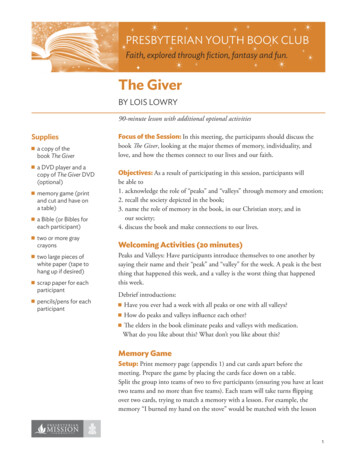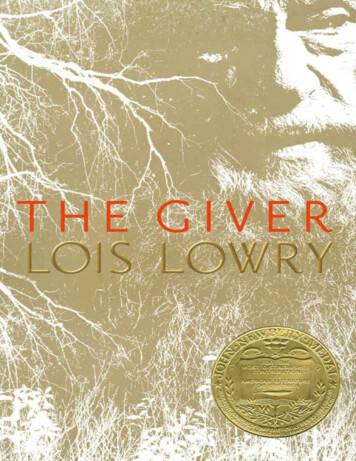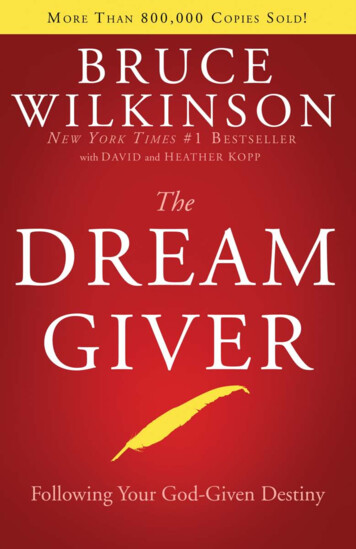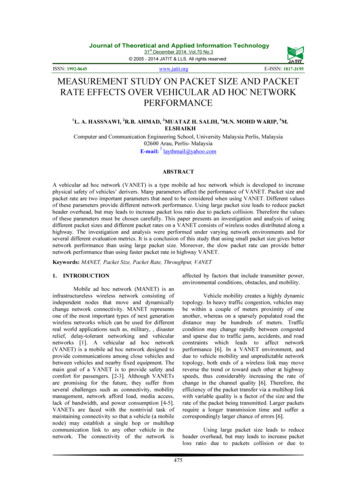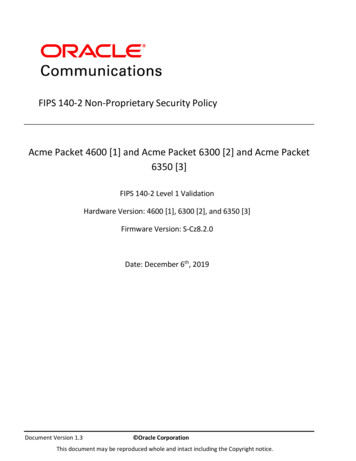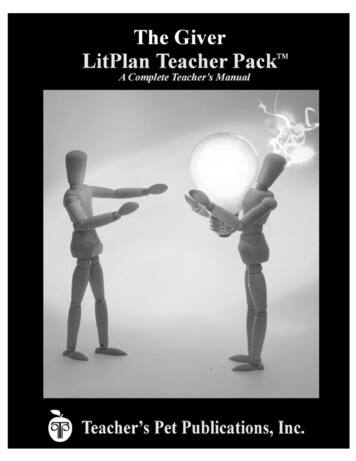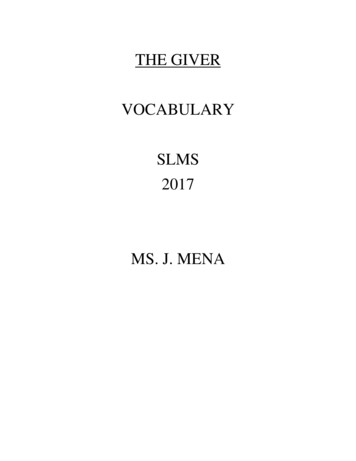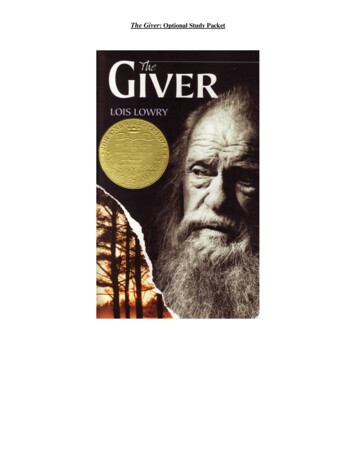
Transcription
The Giver: Optional Study Packet
The Giver: Comprehension QuestionsNote: The following comprehension questions are designed for optional study support. If students want to be proactiveabout preparing for tests or if they are struggling on the comprehension tests, it would be a good idea to complete thequestions below prior to taking the comprehension tests. The questions generally focus on the most important content ofthe reading, so they can help the students to identify the big ideas. While the questions can be useful study material, theywill not relate to every detail that will appear on the tests.Some ideas for using the comprehension questions to support studying: Since the questions follow the reading selections sequentially, students can use the questions to guide theirreading by reading one question at a time and reading the book until they find the answers, thus answering thequestions as they read. Students can use the questions to test their comprehension by answering them after reading the selection. Students can read the material independently and use the questions for discussion with a study peer or at-homereading partner. This works well for students who study with friends or students who have parents, guardians,older siblings, or tutors that want to read the materials along with them.Chapter 1 (Pages 1-10)1. What is one reason the people in this book might be afraid of a plane flying over the community?2. Who is Asher?3. What is one way Asher is different than Jonas?4. Is making students apologize and explain their actions a good idea? Why?5. What is making Jonas feel excited and nervous?6. What can we deduce (figure out) about Jonas’s family from the nightly ritual of sharing feelings?7. Who are the members of Jonas’s family? What are some facts about each?8. What is one hypothesis we can create about Jonas’s world based on the fact that neither he nor his sisterknow what “animals” are?9. The concept of being “released” keeps coming up. What might being released mean?Chapter 2 (Pages 11-19)1. What are some of the unusual aspects of how families are created in this novel?2. What does the Receiver do?3. What happens during the Ceremony of Twelve?4. Who assigns jobs?5. It seems that jobs are assigned based on what?6. What might be some benefits of having a job assigned to you when you are twelve?7. What might be some drawbacks of having a job assigned to you when you are twelve?Chapter 3 (Pages 20-25)1. What is unusual about Jonas’s and Gabe’s eyes?2. What is a “comfort object”?3. What happens to women who are Birthmothers?4. How is the role of birthmother viewed in this society?5. What does the treatment of birthmothers (before and after) suggest about this society?6. When Lily is eight, what is one activity she will be eligible to do?7. What are some things that are assigned to specific age levels?8. What is the role of the Speakers?9. What is unusual about Jonas’s description of the apple when he examines it after the first strangeoccurrence?Chapter 4 (Pages 26-33)1. What word might we use in our society for “Rehabilitation Directors”?2. Why might there be a rule against bragging?3. Do you agree or disagree that it is a good idea to avoid talking about people’s successes? Why?4. What is the rumor among Elevens about completing volunteer hours?5. Why might the Old need assistance?6. What is the main ceremony at the release of the Old?
Chapter 5 (Pages 34-39)1. Is it normal for people around Jonas’s age to have “Stirrings”? Why?2. How are “Stirrings” treated?3. Who else that Jonas knows seem to have “Stirrings”?4. Do you agree with Jonas’s thought, “Always better, less rude, to talk about things that were the same”?5. What does the treatment for the “Stirrings” do?6. How long does the treatment go on?Chapter 6 (Pages 40-49)1. Why do kids younger than seven have jackets that button up the back?2. What does a bike, received at age nine, symbolize?3. Why might Jonas’s family be required to sign a pledge involving Gabe’s extra year of nurturing?4. What happens when someone is released?5. Why was a replacement Caleb needed?6. Is the idea of a replacement child a good one?7. Jonas’s anxiety about Fritz getting his bicycle shows us what about this community?8. Why is the feeling at lunch on the second day of the Ceremonies different than the first?9. What are three very important roles of the Committee of Elders?10. Why might this committee only have elders on it?Chapter 7 (Pages 50-58)1. What is Jonas’s full number?2. Why might children only have numbers instead of names for their first year?3. What are two of the rules Pierre might worry about?4. What do those rules tell us about this community?5. How are children taught to correct their mistakes in this community?6. What are your thoughts about how this community corrects children?7. Why is Jonas so concerned at the end of this chapter?8. Do you think Jonas is right to be concerned? Why?Chapter 8 (Pages 59-64)1. How would it feel to have people apologize every time they made you uncomfortable?2. How would you feel if you had to apologize every time you made someone uncomfortable?3. What are the five attributes needed to be a Receiver of Memory?4. Why might the Receiver of Memory be the most important Elder?5. What does the fact that no one in the community has felt pain (other than scraped knees and similar minorissues) tell us about the community?Chapter 9 (Pages 65-71)1. Why are people treating Jonas differently after the Ceremony of Twelve?2. What does mean when a name is designated “Not-To-Be-Spoken”?3. According to Jonas’s parents, what happened to the previous Receiver-in-Training?4. In Jonas’s directions for being Receiver, what do rules 4 and 5 tell us about this job?5. In Jonas’s directions for being Receiver, what does rule 7 tell us about this job?6. In Jonas’s directions for being Receiver, what do rule 8 tell us about this job?7. Why is Jonas unnerved by rule 8 as he thinks about it more?Chapter 10 (Pages 72-79)1. What does the fact that Jonas has never seen a locked door before tell us about his community?2. What does the fact that Jonas’s dwelling is basically identical to all other community members’ dwellingstell us about the community?3. What are some of the differences between Jonas’s dwelling and that of the Receiver?4. Why would the Receiver have a different dwelling than the rest of the community?5. What does the Receiver look like?6. What is the job of the Receiver?7. What does the fact that Jonas doesn’t know what “downhill” mean about where he lives?
Chapter 11 (Pages 80-87)1. How did Jonas receive the memories of sledding?2. How does this scene change your understanding of what the Receiver’s job is?3. Why isn’t there snow anymore?4. How might Sameness have gotten rid of sunshine?5. Why is the old Receiver’s new name more appropriate to the current situation?Chapter 12 (Pages 88-96)1. What is the “something different” that Jonas noticed with the apple, the faces in the crowd, and Fiona’shair?2. Why would the people in Jonas’s world have made the Sameness get rid of people’s ability to see color?3. How did they get rid of color?4. From the descriptions we’ve had so far, Jonas’s world seems ideal – there is plenty of food for everyone,everyone gets along, people learn well and have jobs doing things they like and are good at. Do you agreewith Jonas that those things are not worth the price of losing colors?Chapter 13 (Pages 97-107)1. What is Jonas’s reasoning for why not being able to see colors is not fair?2. What is Sameness supposed to prevent?3. What memory changes Jonas’s “perception of the color he knew as red”?4. How (and how often) does the Giver assist the Council of Elders?5. Is it important for people to get advice from others who have more knowledge? Why?6. If you could stop things from changing, would you? Why or why not?7. What happens to the memories if the Receiver doesn’t have them?8. What does the Giver mean when he says the instructors “know nothing”?9. The Giver is clearly hurt by some memories. Can memories hurt you?10. Why hasn’t Jonas been hurt by the memories yet?Chapter 14 (Pages 108-117)1. What is different about this memory of riding a sled?2. Why might the Giver not allow Jonas a pain reliever?3. Why does Jonas’s pain cause him to feel lonely?4. Does feeling pain lead to wisdom? How?5. What was one of the decisions the Giver’s wisdom helped him make?6. What are two similarities between Jonas and Gabriel? (use Chapter 3 to help you)7. Do you think Jonas’s decision to not tell what he had done was a good one? Why or why not?Chapter 15 (Pages 118-120)1. How does Jonas help the Giver?2. How did the Giver feel after Jonas helped him?3. Why does the Giver feel that way?Chapter 16 (Pages 121-129)1. What are some of the joyful memories Jonas has experienced?2. Why doesn’t Jonas want to return to the Giver?3. What is the Giver’s favorite memory about?4. What is your opinion of how families deal with people getting older and family structure?5. The fact that Jonas doesn’t recognize the feeling of “love” tells us that no one in his community knows what“love” is. What are the good parts of not knowing what “love” is? What are the bad parts?6. What is Jonas’s first lie to his parents?7. When Jonas gets the memories of colors, he starts to be able to see colors all around him. What willprobably happen after Jonas gets the memory of feeling love?Chapter 17 (Pages 130 - 138)1. The pills that stop the Stirrings also keep people from feeling emotions very deeply. Why would thedesigners have created such a system?2. The fact that children do not know that the good-guys-versus-bad-guys game is about war tells us what?3. Why does Jonas feel like his childhood is slipping away from him?4. How do they decide which one of a pair of twins is released?
Chapter 18 (Pages 139- 145)1. Why did Rosemary request release?2. How did Rosemary’s release affect the community?3. Why might the Giver have been angry about Rosemary’s release?4. Why is it now a rule that Receivers can’t ask for release?Chapter 19 (Pages 146-151)1. What happens when someone is released?2. A euphemism is when people use a gentler word or phrase in place of a harder word or phrase (“tossingyour cookies” instead of “throwing up” or “vomiting”). Why might the community use the euphemism“released”?3. Was Rosemary brave? Why or why not?Chapter 20 (Pages 152-162)1. Why doesn’t Jonas want to go home?2. Why won’t the Giver go with Jonas?3. The Giver didn’t see beyond; he heard beyond. What was he able to hear that no one else could?4. When Jonas leaves, why won’t his parents talk to other people about it at first?5. Why is Jonas supposed to leave his clothes by the river?6. Who is The Giver’s daughter?7. What is the Giver planning on doing after he has helped the community bear the memories?8. What are some reasons for the Giver’s plans for himself after he has helped the community?Chapter 21 (Pages 163-170)1. Who is Jonas’s closest friend? Why are they so close?2. What is the problem that is forcing Jonas to flee before he is ready?3. Why did Jonas steal his father’s bike?4. How does Jonas use his memories of snow?5. No matter how long it has been since Jonas left, planes can move faster than bikes. Still, the planes give uptheir search. How might the plan Jonas and the Giver came up with be connected to how long the planessearched?Chapter 22 (Pages 171-174)1. Why are some of Jonas’s memories fading?2. Jonas is thinking about the situation he is in, and wonders if he made the wrong choice. Did he?3. What is Jonas’s one goal?Chapter 23 (Pages 175-180)1. Jonas feels that “Elsewhere was not far away”, and he hopes to reach it. Is he referring to the same“Elsewhere” from the beginning of the story, where people went when they were released?2. What does it mean when Jonas thinks, “[t]here was no purpose in if-onlys”?3. What is one reason Jonas suddenly has a flood of memories of his family and friends?Post–reading questions1. How does the composition of images on the cover of the book reflect the story?2. Based on details from the novel, what happens to Jonas and Gabe at the end of the novel?3. Why did Lois Lowry leave the ending of the story ambiguous?4. Families have a huge impact on how children grow up. Sometimes adults are not good parents, and hurttheir children’s development; other times, adults might be good parents, but their children need more timeor attention than the parents can provide. Should children be raised by people other than their biologicalparents if the biological parents aren’t willing or able to raise the children well?5. What might be positive about creating Sameness, where humans remove all things that were unexpected,inconvenient, and unusual from life? What might be negative?6. The word “utopia” means a place where everything is perfect. In what ways is the utopia of The Giverperfect? In what ways is the utopia of The Giver something different than perfect?7. Do the needs of the many outweigh the needs of the few? Why or why not?
The Giver: Character NotesNote: One strategy that research proves is one of the most effective strategies for increasing reading comprehension is totake notes while reading. For this reason, we have provided the following list of important characters that appearthroughout the book followed by a large, empty space that we would recommend be used for taking notes as you read.One strategy could be to list every important description of these characters, any time you figure something out aboutthese characters, and any important event that involves these characters. These notes are recommended, but not required,but as an incentive to take good notes and to keep up on them, they will be permitted to be used on one or two "opennotes" tests that will occur throughout this book.JonasJonas's MotherJonas's Father
LilyAsherFionaThe Giver
Other Characters: Any other character that is named in the book and seems significant for any reason can be added toyour notes in the spaces below.Character's Name:Notes on character:Character's Name:Notes on character:Character's Name:Notes on character:Character's Name:Notes on character:Character's Name:Notes on character:Character's Name:Notes on character:Character's Name:Notes on character:Character's Name:Notes on character:Character's Name:Notes on character:
The Giver: Comprehension Questions Note: The following comprehension questions are designed for optional study support. If students want to be proactive about preparing for tests or if they are struggling on the comprehension tests, it would be a good idea to complete the questions below prior to taking the comprehension tests.


